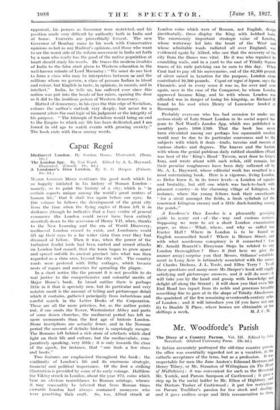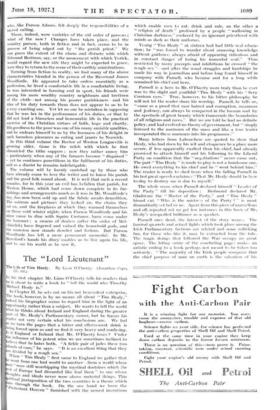Woodforde's Parish
The Diary of a Country Parson. Vol. III. Edited by Joha Beresford. (Oxford University Press. 12s. 6d.) Jr fiction accurately portrayed the old-time country parson, the office was essentially regarded not as a vocation, in the catholic acceptance of the term, but as a profession. It Was respectable for men like Jane Austen's Edmund Bertram and Henry Tilney, or Mr. Staunton of Willingham (in The Head of Midlothian) : it was convenient for such as the Reverend Mr. Yorick, and Parson Sampson of Castlewood ; it gave' step, up .in the social ladder to Mr. Elton of Highbury. and the Doctors Tusher of Castlewood ; it, put few restriction, on Parson Trullibees passion for live stock and dealing; and it gave endless scope and little remuneration to these
who, like Parson Adams, felt deeply the responsibilities of a sacred calling.
These, indeed, were-varieties of the old order of parsons ; what of the new ? Changes have taken place, and the country parson, both in fiction and in fact. seems to be in process of being edged out by " the parish priest." We can guess the extent of the alarm and distaste with which Edmund Bertram, say, or the amusement with which Yorick, would regard the new role they might be expected to grace, were they to return to the scene of their earthly ministrations. Turning from fiction to reality, we find many of the above characteristics blended in the person of the Reverend James Woodforde. He appeared to take orders essentially as a profession, he lived a comfortable life in a comfortable living, lie was interested in farming and in sport, his friends were among his more wealthy country neighbours and brethren of the clOth—not among his poorer parishioners—and his idea of his duty towards them does not appear to us to be a very exacting one. Yet let no one be mistaken in supposing that he was lax in the performance of his duties, or that he did not lead a blameless and honourable life in the practical exercise of the Christian virtues of faith, hope and charity. his goodness to the poor was one of his many amiable qualities, and he endears himself to us by the keenness of his delight in such harmless pleasures as eating and jaunts to Norwich. In this third volume the Rector of Weston Longueville is growing older. Gone is the relish with which he first chronicled the tithe suppers ; now they rather annoy him — particularly when any of the farmers become " disguised " —yet he continues punctilious in the fulfilment of his duties, and as a diarist he remains indefatigable.
The volume will be keenly snatched up by those who have already come to love the writer and to know his parish and the good folk round about. It is well that such a record remains, for in this year an evil has befallen that parish, for Weston House, which had come down complete in its fur- nishings and arrangements much as it was in Mr. Woodforde's day, has now been sold up and the fabric awaits demolition. The mirrors and pictures they looked on, the chairs they sat on, and the fireplaces at which they warmed themselves on those cold winter nights when Parson Woodforde and his niece came to dine with Squire ('ustance, have come under the hammer ; a swarm of dealers (after the order of Mel- chizedek) have fingered and valued the household gods, and the mansion now stands derelict and forlorn. But Parson Woodforde has left a more permanent memorial. In Mr. Beresford's hands his diary. enables us to live again his life, and to see his world as he saw it.



























































 Previous page
Previous page